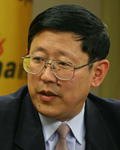|
 |
|
BITTER MEMORIES: Mei Shoulan (front), a survivor of the Nanjing Massacre, during which invading Japanese troops slaughtered more than 300,000 Chinese people, presents flowers in front of a wall of victims' names in Nanjing, east China's Jiangsu Province, on December 13, 2013 (XINHUA) |

Bu Ping (researcher with the Institute of Modern History at the Chinese Academy of Social Sciences):
Despite Abe's abject denial of the historical truth and evidence, Japan is still liable for its wartime crimes against humanity. Japan's war crimes are beyond dispute. During the Tokyo Trials, groups of major political and military leaders in Japan were indicted on 55 counts of "crimes against peace," "conventional war crimes," and "crimes against humanity." Among them were Japan's top leaders, who had plotted and organized crimes against peace and against whom Class-A charges were eventually brought.
After the end of World War II, former Prime Minister Nobusuke Kishi was at the forefront of those encouraging revisionism and he even dedicated a headstone to seven war criminals executed after the Tokyo Trials honoring them as "patriots who died for their country." Coming from the Kishi family, Abe has stepped into his maternal grandfather's shoes and has now gone even further down the revisionist path, claiming that the Tokyo Trials were merely "victor's justice" and the Japanese wartime leaders charged with Class-A war crimes are "not war criminals under Japan's laws."
The truth is that even if Abe acknowledged the verdicts of the Tokyo Trials, it would not be enough, as most of the court battles centered on substantiating the crimes against peace charges, with the crimes against humanity a lower-profile part of the trials.
However, the general definition of crimes against humanity includes murder, extermination, enslavement, deportation and other inhumane acts committed against civilian populations, and persecutions on political, racial or religious grounds, whether or not in violation of the domestic laws of the country where they are perpetrated. Anyone who has a role in planning, organizing, or instigating the aforementioned acts should be held accountable.
In this sense, Japan's use of forced labor and the coerced recruitment of what it euphemistically calls "comfort women," namely the women and girls forced into sexual slavery to serve the Japanese military during World War II, and its use of chemical or biological weapons are all crimes against humanity that were overlooked in postwar trials and should be reexamined today.
The issue of the women forced into sexual slavery by Japan was first raised at the UN by a civilian group in February 1992 and a special rapporteur was tasked with checking the issue. In her 1998 report, the UN's Special Rapporteur Gay J. McDougall concluded, "The Japanese Government remains liable for grave violations of human rights and humanitarian law, violations that amount in their totality to crimes against humanity. The Japanese Government's arguments to the contrary, including arguments that seek to attack the underlying humanitarian law prohibition of enslavement and rape, remain as unpersuasive today as they were when they were first raised before the Nuremberg war crimes tribunal more than 50 years ago."
Despite all the evidence, including first-hand testimonies, and the condemnation of the international community, Abe publicly declared that there was "no evidence" that women had been coerced into sexual slavery when he first became prime minister in 2006. Now, in office for the second time, Abe has said he intends to review the 1993 Kono Statement, which expresses remorse to former "comfort women."
Abe is certainly not reticent when it comes to showing his revisionist streak, but his worrisome rhetoric denying Japan's war crimes against humanity and its liabilities, and his relentless efforts to incrementally revise the Constitution and rearm Japan, have dragged Japan into an abyss of disgrace. A real danger to the international community as well as Japan looms large as Abe's words and acts mirror those of the wartime politicians of militarist Japan.
So far this year, Abe has visited India, the Middle East and Africa as part of his diplomatic strategy, but while this may have succeeded in increasing business opportunities for his country, he has not won any sympathy or repaired the damage he has caused to Japan's image in the international community with his denial-of-the-truth posturing. He never will unless he truly repents.
|
